Efficacy of omeprazole vs ranitidine in managing peptic ulcer
VerifiedAdded on 2023/01/09
|15
|5005
|35
AI Summary
This study analyzes the efficacy of omeprazole vs ranitidine in managing peptic ulcer. It compares the effectiveness of both treatments and recommends the most effective option.
Contribute Materials
Your contribution can guide someone’s learning journey. Share your
documents today.
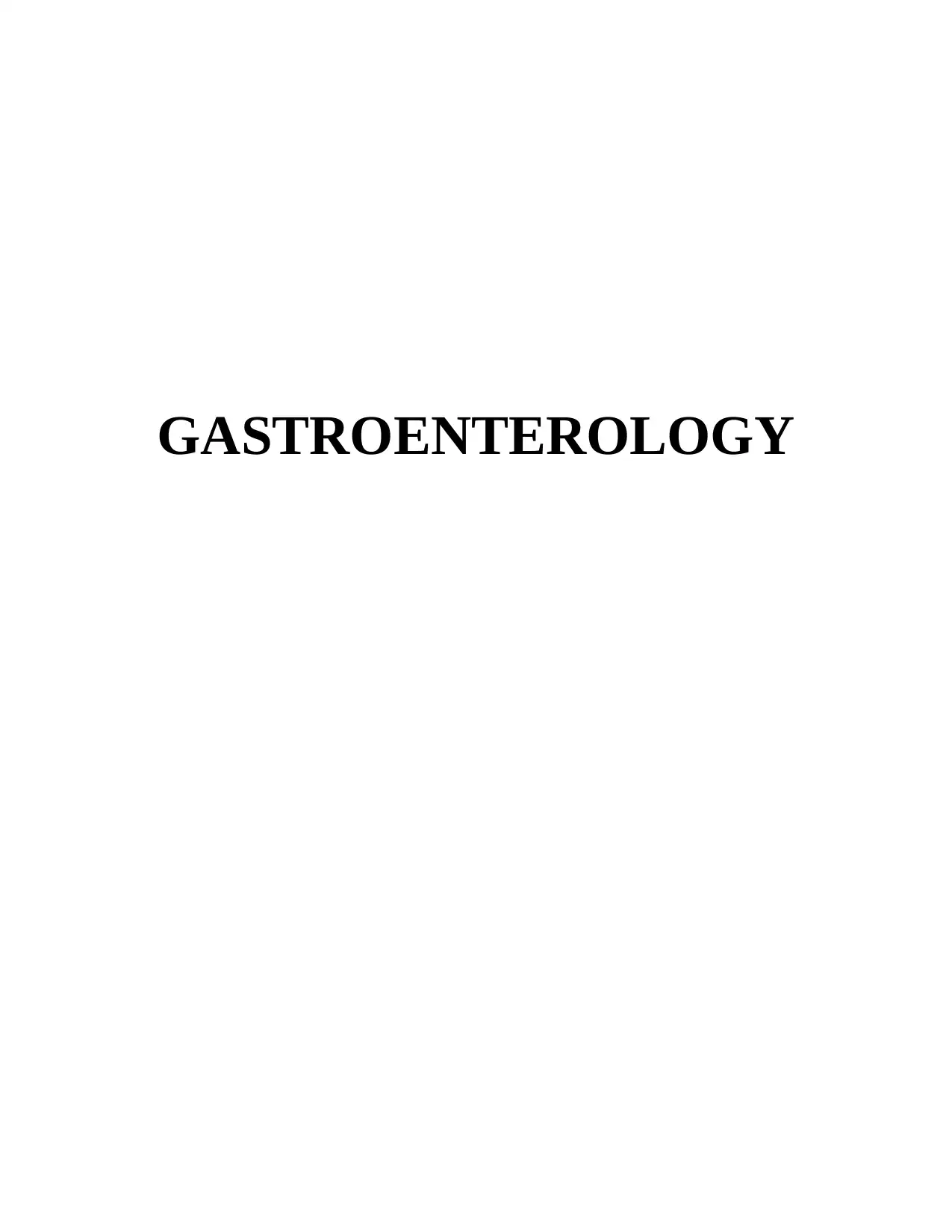
GASTROENTEROLOGY
Secure Best Marks with AI Grader
Need help grading? Try our AI Grader for instant feedback on your assignments.
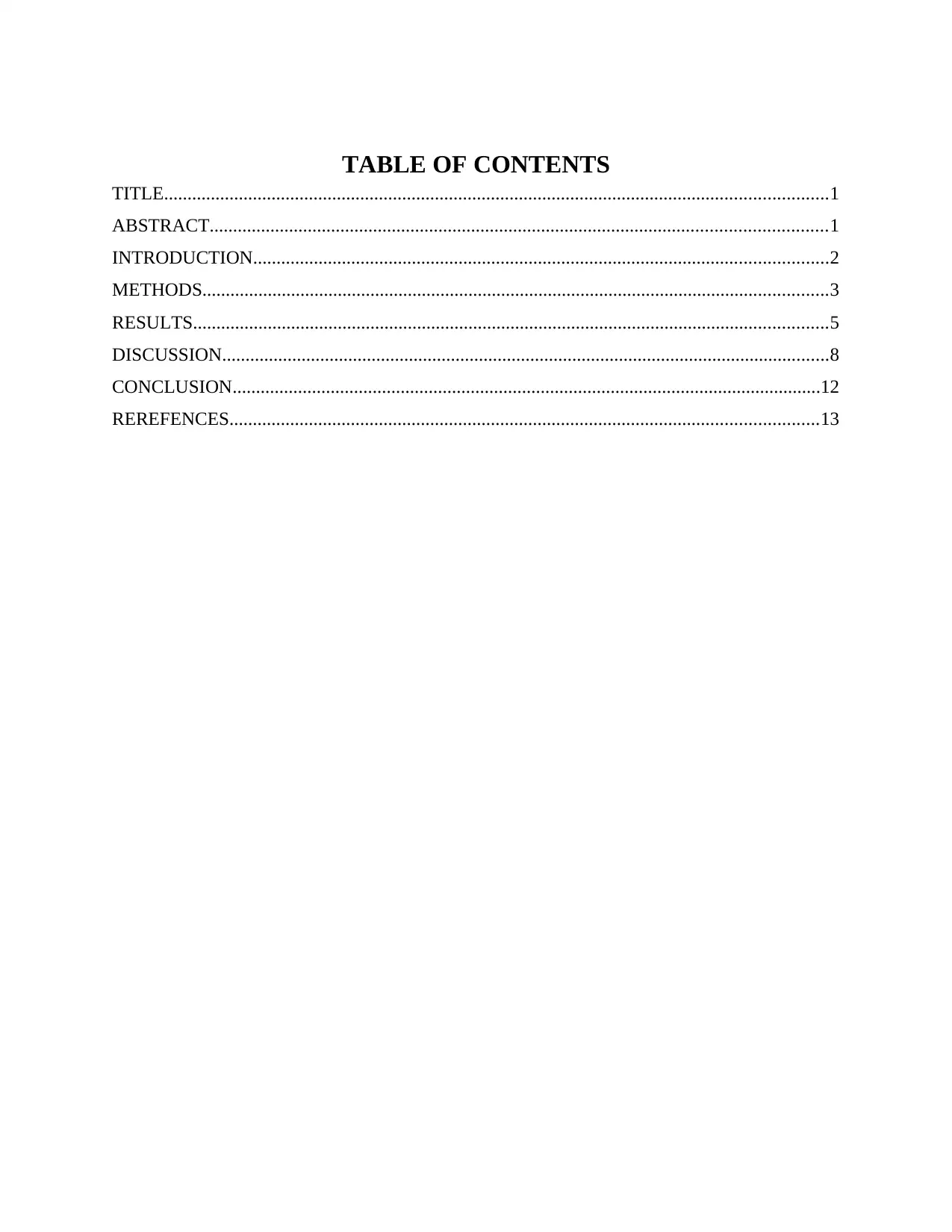
TABLE OF CONTENTS
TITLE..............................................................................................................................................1
ABSTRACT....................................................................................................................................1
INTRODUCTION...........................................................................................................................2
METHODS......................................................................................................................................3
RESULTS........................................................................................................................................5
DISCUSSION..................................................................................................................................8
CONCLUSION..............................................................................................................................12
REREFENCES..............................................................................................................................13
TITLE..............................................................................................................................................1
ABSTRACT....................................................................................................................................1
INTRODUCTION...........................................................................................................................2
METHODS......................................................................................................................................3
RESULTS........................................................................................................................................5
DISCUSSION..................................................................................................................................8
CONCLUSION..............................................................................................................................12
REREFENCES..............................................................................................................................13
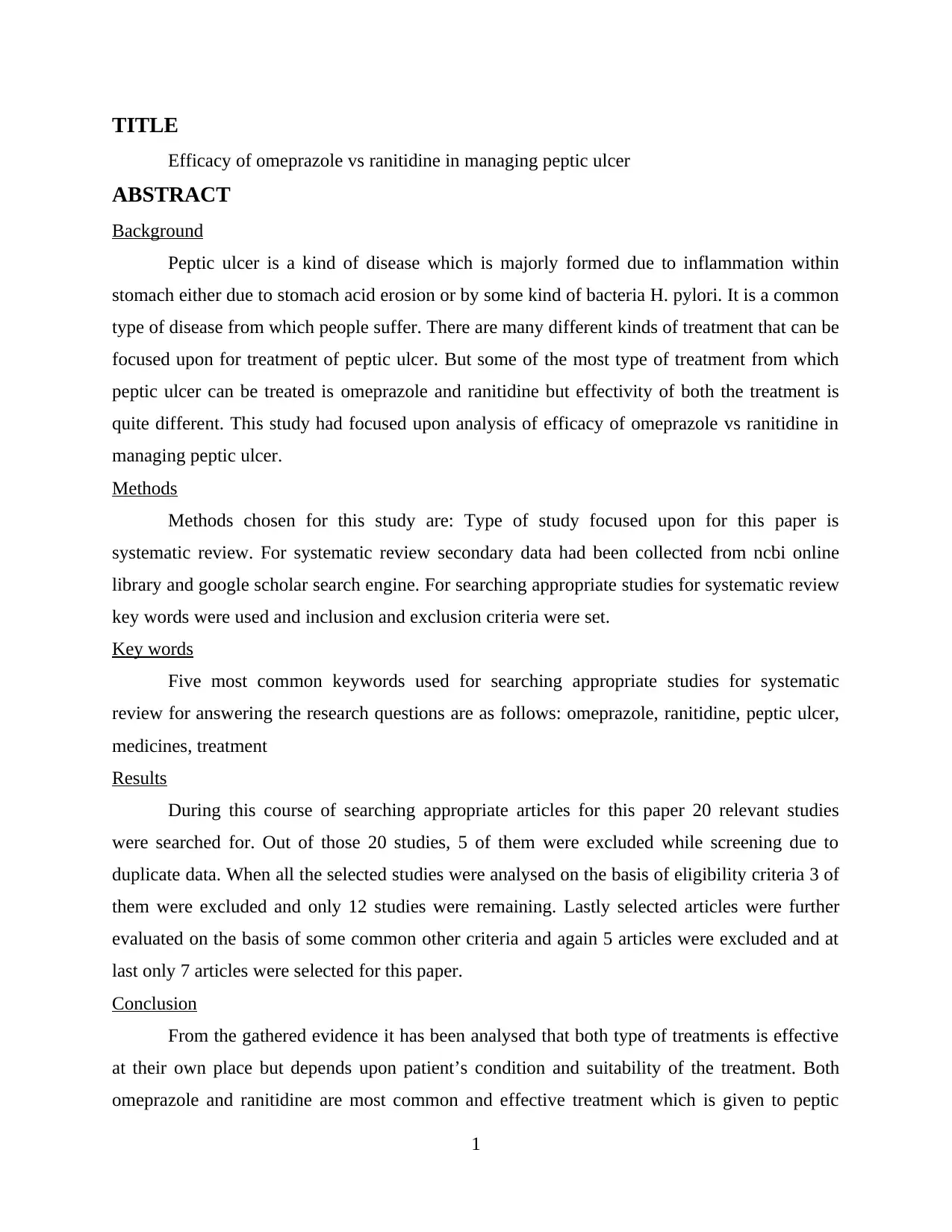
TITLE
Efficacy of omeprazole vs ranitidine in managing peptic ulcer
ABSTRACT
Background
Peptic ulcer is a kind of disease which is majorly formed due to inflammation within
stomach either due to stomach acid erosion or by some kind of bacteria H. pylori. It is a common
type of disease from which people suffer. There are many different kinds of treatment that can be
focused upon for treatment of peptic ulcer. But some of the most type of treatment from which
peptic ulcer can be treated is omeprazole and ranitidine but effectivity of both the treatment is
quite different. This study had focused upon analysis of efficacy of omeprazole vs ranitidine in
managing peptic ulcer.
Methods
Methods chosen for this study are: Type of study focused upon for this paper is
systematic review. For systematic review secondary data had been collected from ncbi online
library and google scholar search engine. For searching appropriate studies for systematic review
key words were used and inclusion and exclusion criteria were set.
Key words
Five most common keywords used for searching appropriate studies for systematic
review for answering the research questions are as follows: omeprazole, ranitidine, peptic ulcer,
medicines, treatment
Results
During this course of searching appropriate articles for this paper 20 relevant studies
were searched for. Out of those 20 studies, 5 of them were excluded while screening due to
duplicate data. When all the selected studies were analysed on the basis of eligibility criteria 3 of
them were excluded and only 12 studies were remaining. Lastly selected articles were further
evaluated on the basis of some common other criteria and again 5 articles were excluded and at
last only 7 articles were selected for this paper.
Conclusion
From the gathered evidence it has been analysed that both type of treatments is effective
at their own place but depends upon patient’s condition and suitability of the treatment. Both
omeprazole and ranitidine are most common and effective treatment which is given to peptic
1
Efficacy of omeprazole vs ranitidine in managing peptic ulcer
ABSTRACT
Background
Peptic ulcer is a kind of disease which is majorly formed due to inflammation within
stomach either due to stomach acid erosion or by some kind of bacteria H. pylori. It is a common
type of disease from which people suffer. There are many different kinds of treatment that can be
focused upon for treatment of peptic ulcer. But some of the most type of treatment from which
peptic ulcer can be treated is omeprazole and ranitidine but effectivity of both the treatment is
quite different. This study had focused upon analysis of efficacy of omeprazole vs ranitidine in
managing peptic ulcer.
Methods
Methods chosen for this study are: Type of study focused upon for this paper is
systematic review. For systematic review secondary data had been collected from ncbi online
library and google scholar search engine. For searching appropriate studies for systematic review
key words were used and inclusion and exclusion criteria were set.
Key words
Five most common keywords used for searching appropriate studies for systematic
review for answering the research questions are as follows: omeprazole, ranitidine, peptic ulcer,
medicines, treatment
Results
During this course of searching appropriate articles for this paper 20 relevant studies
were searched for. Out of those 20 studies, 5 of them were excluded while screening due to
duplicate data. When all the selected studies were analysed on the basis of eligibility criteria 3 of
them were excluded and only 12 studies were remaining. Lastly selected articles were further
evaluated on the basis of some common other criteria and again 5 articles were excluded and at
last only 7 articles were selected for this paper.
Conclusion
From the gathered evidence it has been analysed that both type of treatments is effective
at their own place but depends upon patient’s condition and suitability of the treatment. Both
omeprazole and ranitidine are most common and effective treatment which is given to peptic
1
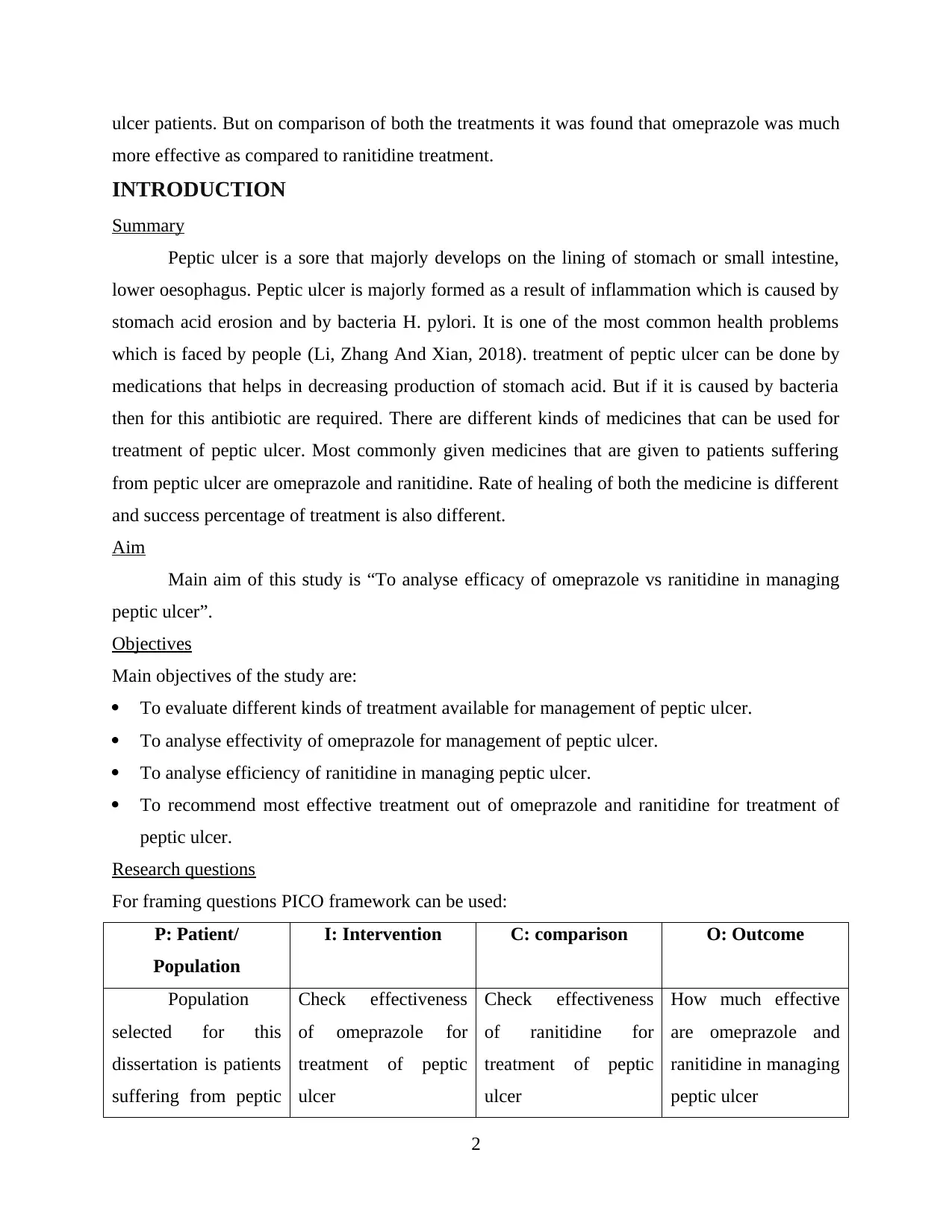
ulcer patients. But on comparison of both the treatments it was found that omeprazole was much
more effective as compared to ranitidine treatment.
INTRODUCTION
Summary
Peptic ulcer is a sore that majorly develops on the lining of stomach or small intestine,
lower oesophagus. Peptic ulcer is majorly formed as a result of inflammation which is caused by
stomach acid erosion and by bacteria H. pylori. It is one of the most common health problems
which is faced by people (Li, Zhang And Xian, 2018). treatment of peptic ulcer can be done by
medications that helps in decreasing production of stomach acid. But if it is caused by bacteria
then for this antibiotic are required. There are different kinds of medicines that can be used for
treatment of peptic ulcer. Most commonly given medicines that are given to patients suffering
from peptic ulcer are omeprazole and ranitidine. Rate of healing of both the medicine is different
and success percentage of treatment is also different.
Aim
Main aim of this study is “To analyse efficacy of omeprazole vs ranitidine in managing
peptic ulcer”.
Objectives
Main objectives of the study are:
To evaluate different kinds of treatment available for management of peptic ulcer.
To analyse effectivity of omeprazole for management of peptic ulcer.
To analyse efficiency of ranitidine in managing peptic ulcer.
To recommend most effective treatment out of omeprazole and ranitidine for treatment of
peptic ulcer.
Research questions
For framing questions PICO framework can be used:
P: Patient/
Population
I: Intervention C: comparison O: Outcome
Population
selected for this
dissertation is patients
suffering from peptic
Check effectiveness
of omeprazole for
treatment of peptic
ulcer
Check effectiveness
of ranitidine for
treatment of peptic
ulcer
How much effective
are omeprazole and
ranitidine in managing
peptic ulcer
2
more effective as compared to ranitidine treatment.
INTRODUCTION
Summary
Peptic ulcer is a sore that majorly develops on the lining of stomach or small intestine,
lower oesophagus. Peptic ulcer is majorly formed as a result of inflammation which is caused by
stomach acid erosion and by bacteria H. pylori. It is one of the most common health problems
which is faced by people (Li, Zhang And Xian, 2018). treatment of peptic ulcer can be done by
medications that helps in decreasing production of stomach acid. But if it is caused by bacteria
then for this antibiotic are required. There are different kinds of medicines that can be used for
treatment of peptic ulcer. Most commonly given medicines that are given to patients suffering
from peptic ulcer are omeprazole and ranitidine. Rate of healing of both the medicine is different
and success percentage of treatment is also different.
Aim
Main aim of this study is “To analyse efficacy of omeprazole vs ranitidine in managing
peptic ulcer”.
Objectives
Main objectives of the study are:
To evaluate different kinds of treatment available for management of peptic ulcer.
To analyse effectivity of omeprazole for management of peptic ulcer.
To analyse efficiency of ranitidine in managing peptic ulcer.
To recommend most effective treatment out of omeprazole and ranitidine for treatment of
peptic ulcer.
Research questions
For framing questions PICO framework can be used:
P: Patient/
Population
I: Intervention C: comparison O: Outcome
Population
selected for this
dissertation is patients
suffering from peptic
Check effectiveness
of omeprazole for
treatment of peptic
ulcer
Check effectiveness
of ranitidine for
treatment of peptic
ulcer
How much effective
are omeprazole and
ranitidine in managing
peptic ulcer
2
Secure Best Marks with AI Grader
Need help grading? Try our AI Grader for instant feedback on your assignments.
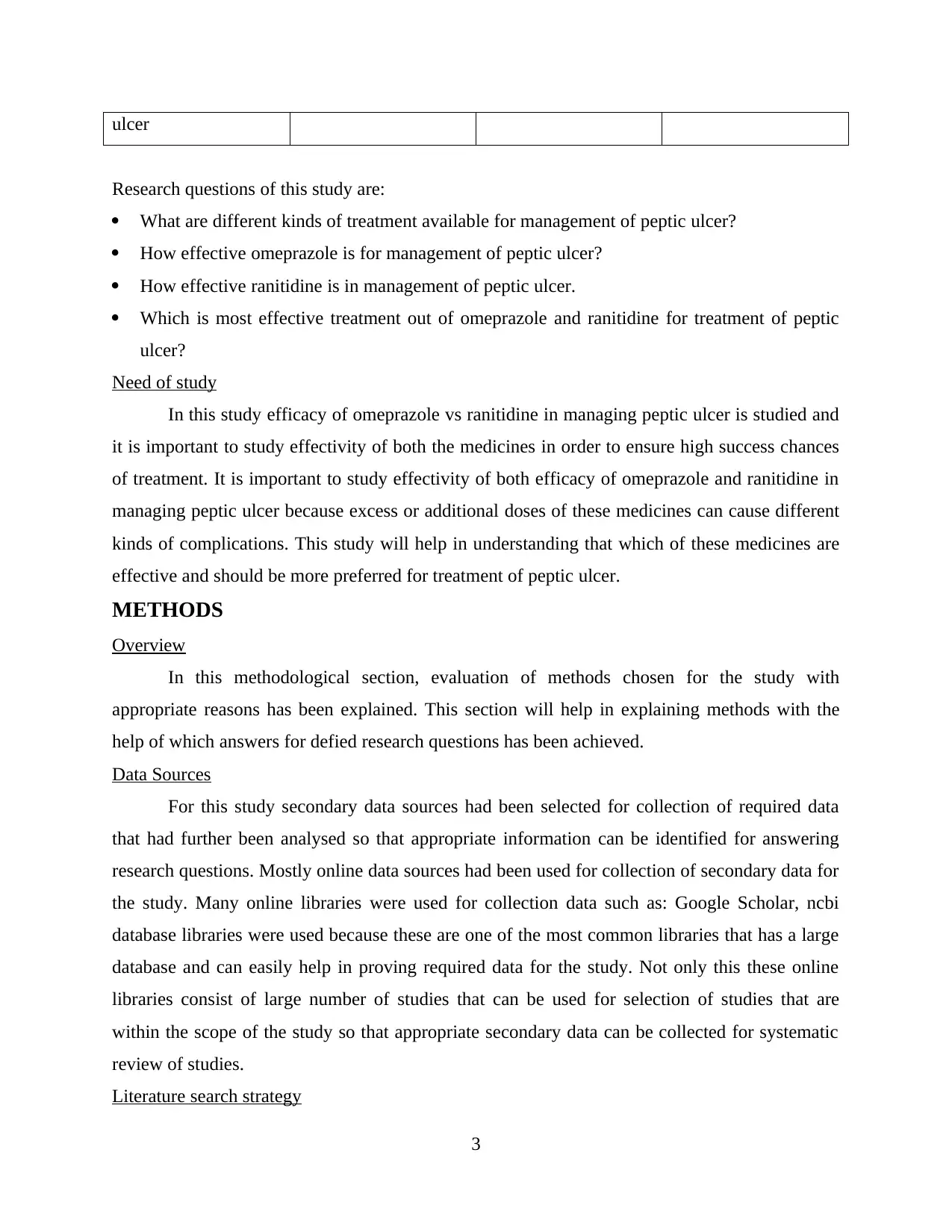
ulcer
Research questions of this study are:
What are different kinds of treatment available for management of peptic ulcer?
How effective omeprazole is for management of peptic ulcer?
How effective ranitidine is in management of peptic ulcer.
Which is most effective treatment out of omeprazole and ranitidine for treatment of peptic
ulcer?
Need of study
In this study efficacy of omeprazole vs ranitidine in managing peptic ulcer is studied and
it is important to study effectivity of both the medicines in order to ensure high success chances
of treatment. It is important to study effectivity of both efficacy of omeprazole and ranitidine in
managing peptic ulcer because excess or additional doses of these medicines can cause different
kinds of complications. This study will help in understanding that which of these medicines are
effective and should be more preferred for treatment of peptic ulcer.
METHODS
Overview
In this methodological section, evaluation of methods chosen for the study with
appropriate reasons has been explained. This section will help in explaining methods with the
help of which answers for defied research questions has been achieved.
Data Sources
For this study secondary data sources had been selected for collection of required data
that had further been analysed so that appropriate information can be identified for answering
research questions. Mostly online data sources had been used for collection of secondary data for
the study. Many online libraries were used for collection data such as: Google Scholar, ncbi
database libraries were used because these are one of the most common libraries that has a large
database and can easily help in proving required data for the study. Not only this these online
libraries consist of large number of studies that can be used for selection of studies that are
within the scope of the study so that appropriate secondary data can be collected for systematic
review of studies.
Literature search strategy
3
Research questions of this study are:
What are different kinds of treatment available for management of peptic ulcer?
How effective omeprazole is for management of peptic ulcer?
How effective ranitidine is in management of peptic ulcer.
Which is most effective treatment out of omeprazole and ranitidine for treatment of peptic
ulcer?
Need of study
In this study efficacy of omeprazole vs ranitidine in managing peptic ulcer is studied and
it is important to study effectivity of both the medicines in order to ensure high success chances
of treatment. It is important to study effectivity of both efficacy of omeprazole and ranitidine in
managing peptic ulcer because excess or additional doses of these medicines can cause different
kinds of complications. This study will help in understanding that which of these medicines are
effective and should be more preferred for treatment of peptic ulcer.
METHODS
Overview
In this methodological section, evaluation of methods chosen for the study with
appropriate reasons has been explained. This section will help in explaining methods with the
help of which answers for defied research questions has been achieved.
Data Sources
For this study secondary data sources had been selected for collection of required data
that had further been analysed so that appropriate information can be identified for answering
research questions. Mostly online data sources had been used for collection of secondary data for
the study. Many online libraries were used for collection data such as: Google Scholar, ncbi
database libraries were used because these are one of the most common libraries that has a large
database and can easily help in proving required data for the study. Not only this these online
libraries consist of large number of studies that can be used for selection of studies that are
within the scope of the study so that appropriate secondary data can be collected for systematic
review of studies.
Literature search strategy
3
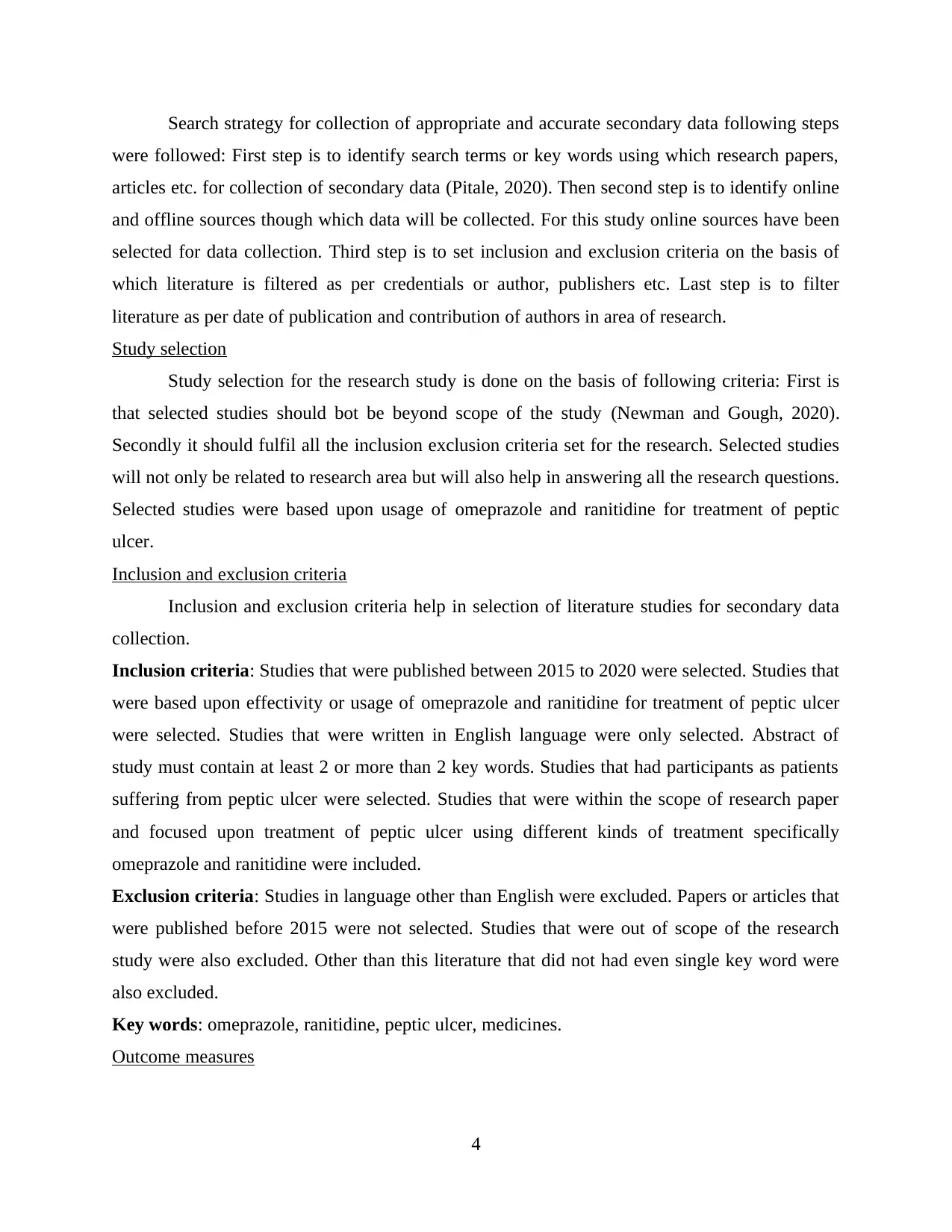
Search strategy for collection of appropriate and accurate secondary data following steps
were followed: First step is to identify search terms or key words using which research papers,
articles etc. for collection of secondary data (Pitale, 2020). Then second step is to identify online
and offline sources though which data will be collected. For this study online sources have been
selected for data collection. Third step is to set inclusion and exclusion criteria on the basis of
which literature is filtered as per credentials or author, publishers etc. Last step is to filter
literature as per date of publication and contribution of authors in area of research.
Study selection
Study selection for the research study is done on the basis of following criteria: First is
that selected studies should bot be beyond scope of the study (Newman and Gough, 2020).
Secondly it should fulfil all the inclusion exclusion criteria set for the research. Selected studies
will not only be related to research area but will also help in answering all the research questions.
Selected studies were based upon usage of omeprazole and ranitidine for treatment of peptic
ulcer.
Inclusion and exclusion criteria
Inclusion and exclusion criteria help in selection of literature studies for secondary data
collection.
Inclusion criteria: Studies that were published between 2015 to 2020 were selected. Studies that
were based upon effectivity or usage of omeprazole and ranitidine for treatment of peptic ulcer
were selected. Studies that were written in English language were only selected. Abstract of
study must contain at least 2 or more than 2 key words. Studies that had participants as patients
suffering from peptic ulcer were selected. Studies that were within the scope of research paper
and focused upon treatment of peptic ulcer using different kinds of treatment specifically
omeprazole and ranitidine were included.
Exclusion criteria: Studies in language other than English were excluded. Papers or articles that
were published before 2015 were not selected. Studies that were out of scope of the research
study were also excluded. Other than this literature that did not had even single key word were
also excluded.
Key words: omeprazole, ranitidine, peptic ulcer, medicines.
Outcome measures
4
were followed: First step is to identify search terms or key words using which research papers,
articles etc. for collection of secondary data (Pitale, 2020). Then second step is to identify online
and offline sources though which data will be collected. For this study online sources have been
selected for data collection. Third step is to set inclusion and exclusion criteria on the basis of
which literature is filtered as per credentials or author, publishers etc. Last step is to filter
literature as per date of publication and contribution of authors in area of research.
Study selection
Study selection for the research study is done on the basis of following criteria: First is
that selected studies should bot be beyond scope of the study (Newman and Gough, 2020).
Secondly it should fulfil all the inclusion exclusion criteria set for the research. Selected studies
will not only be related to research area but will also help in answering all the research questions.
Selected studies were based upon usage of omeprazole and ranitidine for treatment of peptic
ulcer.
Inclusion and exclusion criteria
Inclusion and exclusion criteria help in selection of literature studies for secondary data
collection.
Inclusion criteria: Studies that were published between 2015 to 2020 were selected. Studies that
were based upon effectivity or usage of omeprazole and ranitidine for treatment of peptic ulcer
were selected. Studies that were written in English language were only selected. Abstract of
study must contain at least 2 or more than 2 key words. Studies that had participants as patients
suffering from peptic ulcer were selected. Studies that were within the scope of research paper
and focused upon treatment of peptic ulcer using different kinds of treatment specifically
omeprazole and ranitidine were included.
Exclusion criteria: Studies in language other than English were excluded. Papers or articles that
were published before 2015 were not selected. Studies that were out of scope of the research
study were also excluded. Other than this literature that did not had even single key word were
also excluded.
Key words: omeprazole, ranitidine, peptic ulcer, medicines.
Outcome measures
4
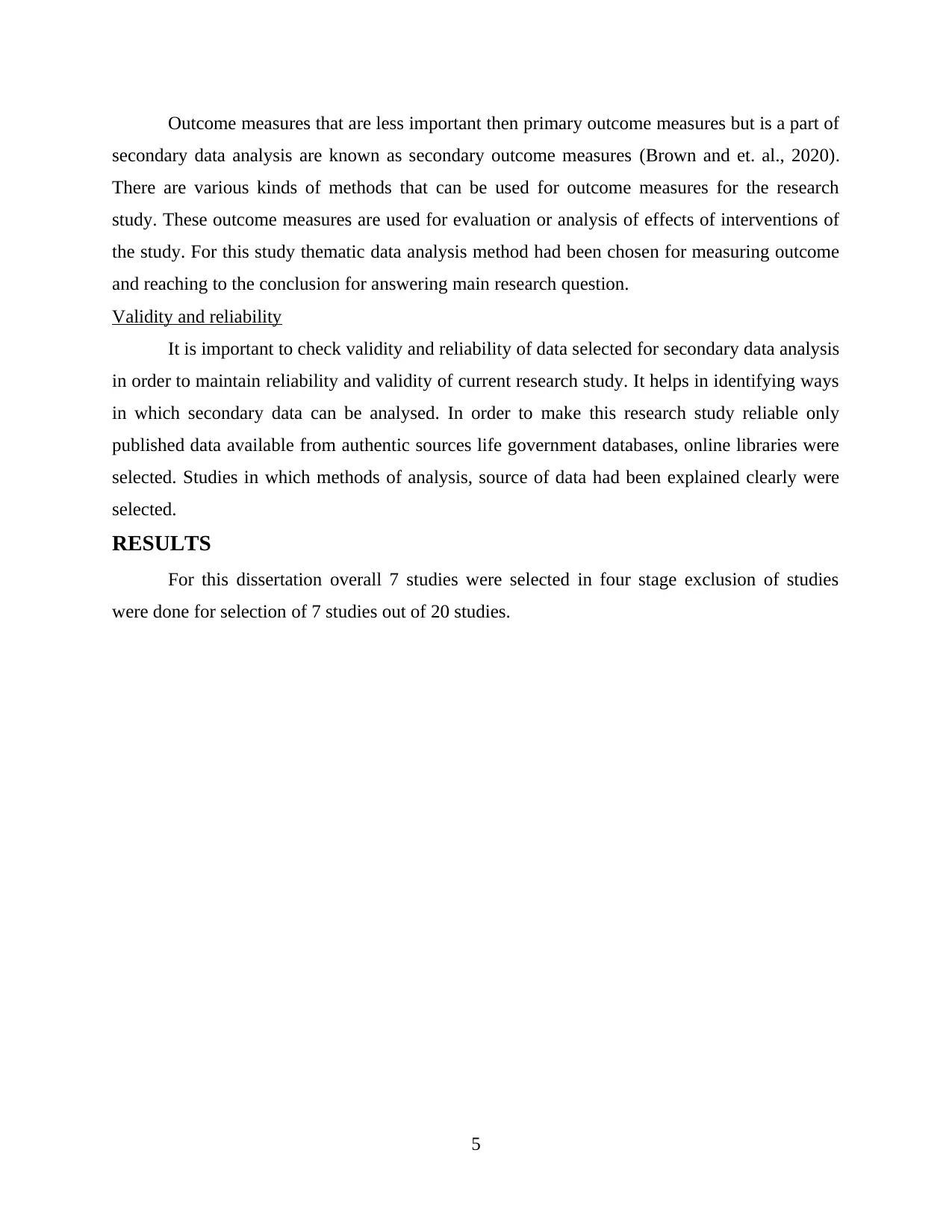
Outcome measures that are less important then primary outcome measures but is a part of
secondary data analysis are known as secondary outcome measures (Brown and et. al., 2020).
There are various kinds of methods that can be used for outcome measures for the research
study. These outcome measures are used for evaluation or analysis of effects of interventions of
the study. For this study thematic data analysis method had been chosen for measuring outcome
and reaching to the conclusion for answering main research question.
Validity and reliability
It is important to check validity and reliability of data selected for secondary data analysis
in order to maintain reliability and validity of current research study. It helps in identifying ways
in which secondary data can be analysed. In order to make this research study reliable only
published data available from authentic sources life government databases, online libraries were
selected. Studies in which methods of analysis, source of data had been explained clearly were
selected.
RESULTS
For this dissertation overall 7 studies were selected in four stage exclusion of studies
were done for selection of 7 studies out of 20 studies.
5
secondary data analysis are known as secondary outcome measures (Brown and et. al., 2020).
There are various kinds of methods that can be used for outcome measures for the research
study. These outcome measures are used for evaluation or analysis of effects of interventions of
the study. For this study thematic data analysis method had been chosen for measuring outcome
and reaching to the conclusion for answering main research question.
Validity and reliability
It is important to check validity and reliability of data selected for secondary data analysis
in order to maintain reliability and validity of current research study. It helps in identifying ways
in which secondary data can be analysed. In order to make this research study reliable only
published data available from authentic sources life government databases, online libraries were
selected. Studies in which methods of analysis, source of data had been explained clearly were
selected.
RESULTS
For this dissertation overall 7 studies were selected in four stage exclusion of studies
were done for selection of 7 studies out of 20 studies.
5
Paraphrase This Document
Need a fresh take? Get an instant paraphrase of this document with our AI Paraphraser
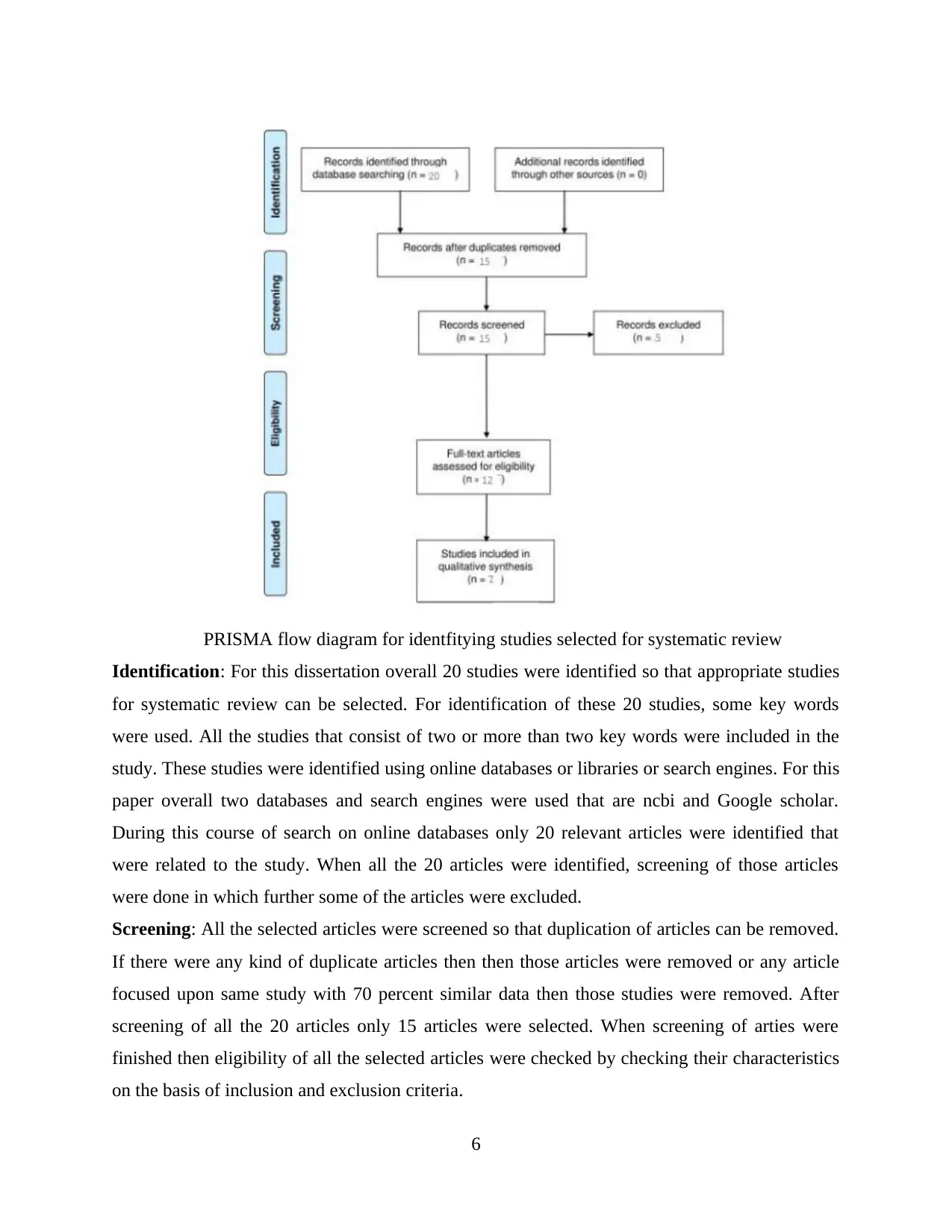
PRISMA flow diagram for identfitying studies selected for systematic review
Identification: For this dissertation overall 20 studies were identified so that appropriate studies
for systematic review can be selected. For identification of these 20 studies, some key words
were used. All the studies that consist of two or more than two key words were included in the
study. These studies were identified using online databases or libraries or search engines. For this
paper overall two databases and search engines were used that are ncbi and Google scholar.
During this course of search on online databases only 20 relevant articles were identified that
were related to the study. When all the 20 articles were identified, screening of those articles
were done in which further some of the articles were excluded.
Screening: All the selected articles were screened so that duplication of articles can be removed.
If there were any kind of duplicate articles then then those articles were removed or any article
focused upon same study with 70 percent similar data then those studies were removed. After
screening of all the 20 articles only 15 articles were selected. When screening of arties were
finished then eligibility of all the selected articles were checked by checking their characteristics
on the basis of inclusion and exclusion criteria.
6
Identification: For this dissertation overall 20 studies were identified so that appropriate studies
for systematic review can be selected. For identification of these 20 studies, some key words
were used. All the studies that consist of two or more than two key words were included in the
study. These studies were identified using online databases or libraries or search engines. For this
paper overall two databases and search engines were used that are ncbi and Google scholar.
During this course of search on online databases only 20 relevant articles were identified that
were related to the study. When all the 20 articles were identified, screening of those articles
were done in which further some of the articles were excluded.
Screening: All the selected articles were screened so that duplication of articles can be removed.
If there were any kind of duplicate articles then then those articles were removed or any article
focused upon same study with 70 percent similar data then those studies were removed. After
screening of all the 20 articles only 15 articles were selected. When screening of arties were
finished then eligibility of all the selected articles were checked by checking their characteristics
on the basis of inclusion and exclusion criteria.
6
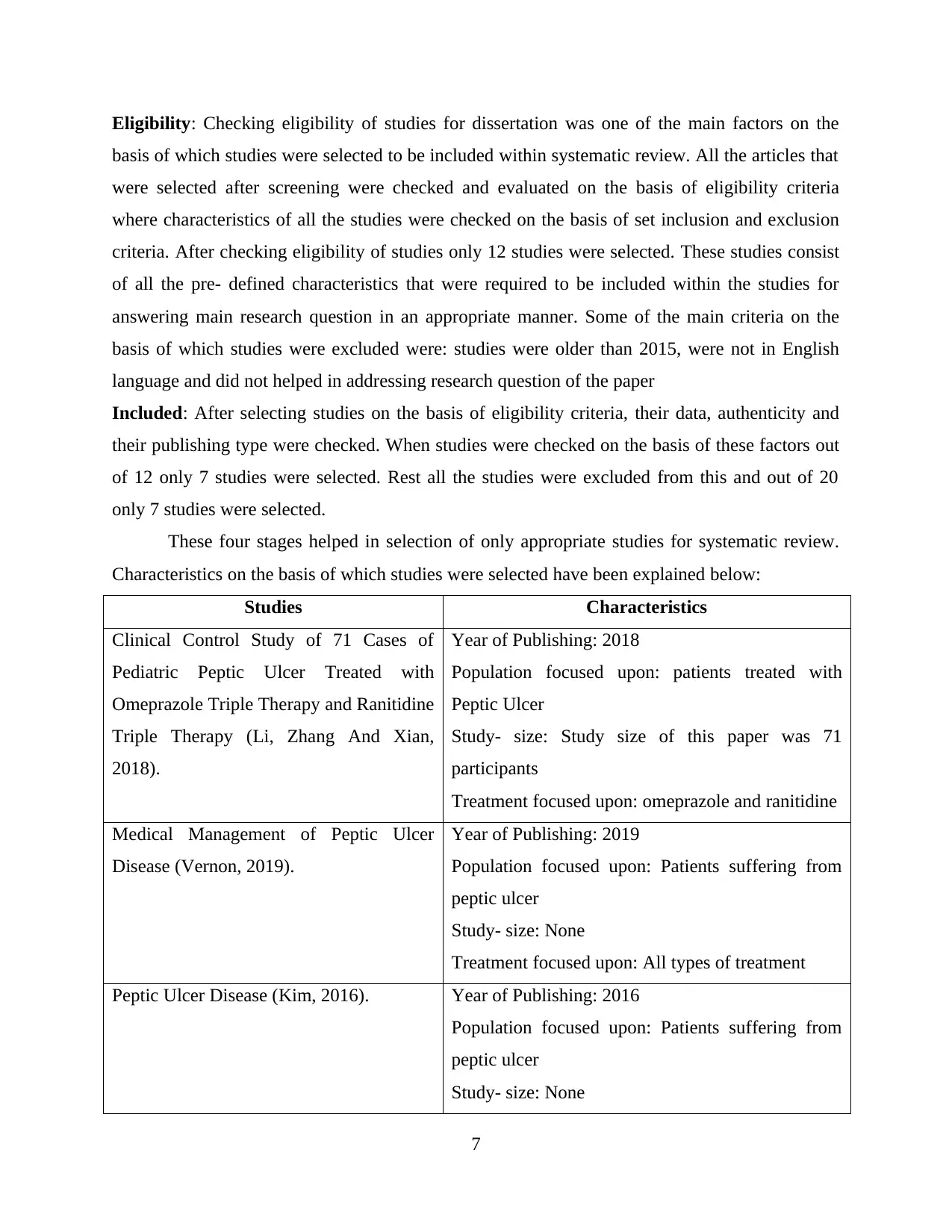
Eligibility: Checking eligibility of studies for dissertation was one of the main factors on the
basis of which studies were selected to be included within systematic review. All the articles that
were selected after screening were checked and evaluated on the basis of eligibility criteria
where characteristics of all the studies were checked on the basis of set inclusion and exclusion
criteria. After checking eligibility of studies only 12 studies were selected. These studies consist
of all the pre- defined characteristics that were required to be included within the studies for
answering main research question in an appropriate manner. Some of the main criteria on the
basis of which studies were excluded were: studies were older than 2015, were not in English
language and did not helped in addressing research question of the paper
Included: After selecting studies on the basis of eligibility criteria, their data, authenticity and
their publishing type were checked. When studies were checked on the basis of these factors out
of 12 only 7 studies were selected. Rest all the studies were excluded from this and out of 20
only 7 studies were selected.
These four stages helped in selection of only appropriate studies for systematic review.
Characteristics on the basis of which studies were selected have been explained below:
Studies Characteristics
Clinical Control Study of 71 Cases of
Pediatric Peptic Ulcer Treated with
Omeprazole Triple Therapy and Ranitidine
Triple Therapy (Li, Zhang And Xian,
2018).
Year of Publishing: 2018
Population focused upon: patients treated with
Peptic Ulcer
Study- size: Study size of this paper was 71
participants
Treatment focused upon: omeprazole and ranitidine
Medical Management of Peptic Ulcer
Disease (Vernon, 2019).
Year of Publishing: 2019
Population focused upon: Patients suffering from
peptic ulcer
Study- size: None
Treatment focused upon: All types of treatment
Peptic Ulcer Disease (Kim, 2016). Year of Publishing: 2016
Population focused upon: Patients suffering from
peptic ulcer
Study- size: None
7
basis of which studies were selected to be included within systematic review. All the articles that
were selected after screening were checked and evaluated on the basis of eligibility criteria
where characteristics of all the studies were checked on the basis of set inclusion and exclusion
criteria. After checking eligibility of studies only 12 studies were selected. These studies consist
of all the pre- defined characteristics that were required to be included within the studies for
answering main research question in an appropriate manner. Some of the main criteria on the
basis of which studies were excluded were: studies were older than 2015, were not in English
language and did not helped in addressing research question of the paper
Included: After selecting studies on the basis of eligibility criteria, their data, authenticity and
their publishing type were checked. When studies were checked on the basis of these factors out
of 12 only 7 studies were selected. Rest all the studies were excluded from this and out of 20
only 7 studies were selected.
These four stages helped in selection of only appropriate studies for systematic review.
Characteristics on the basis of which studies were selected have been explained below:
Studies Characteristics
Clinical Control Study of 71 Cases of
Pediatric Peptic Ulcer Treated with
Omeprazole Triple Therapy and Ranitidine
Triple Therapy (Li, Zhang And Xian,
2018).
Year of Publishing: 2018
Population focused upon: patients treated with
Peptic Ulcer
Study- size: Study size of this paper was 71
participants
Treatment focused upon: omeprazole and ranitidine
Medical Management of Peptic Ulcer
Disease (Vernon, 2019).
Year of Publishing: 2019
Population focused upon: Patients suffering from
peptic ulcer
Study- size: None
Treatment focused upon: All types of treatment
Peptic Ulcer Disease (Kim, 2016). Year of Publishing: 2016
Population focused upon: Patients suffering from
peptic ulcer
Study- size: None
7
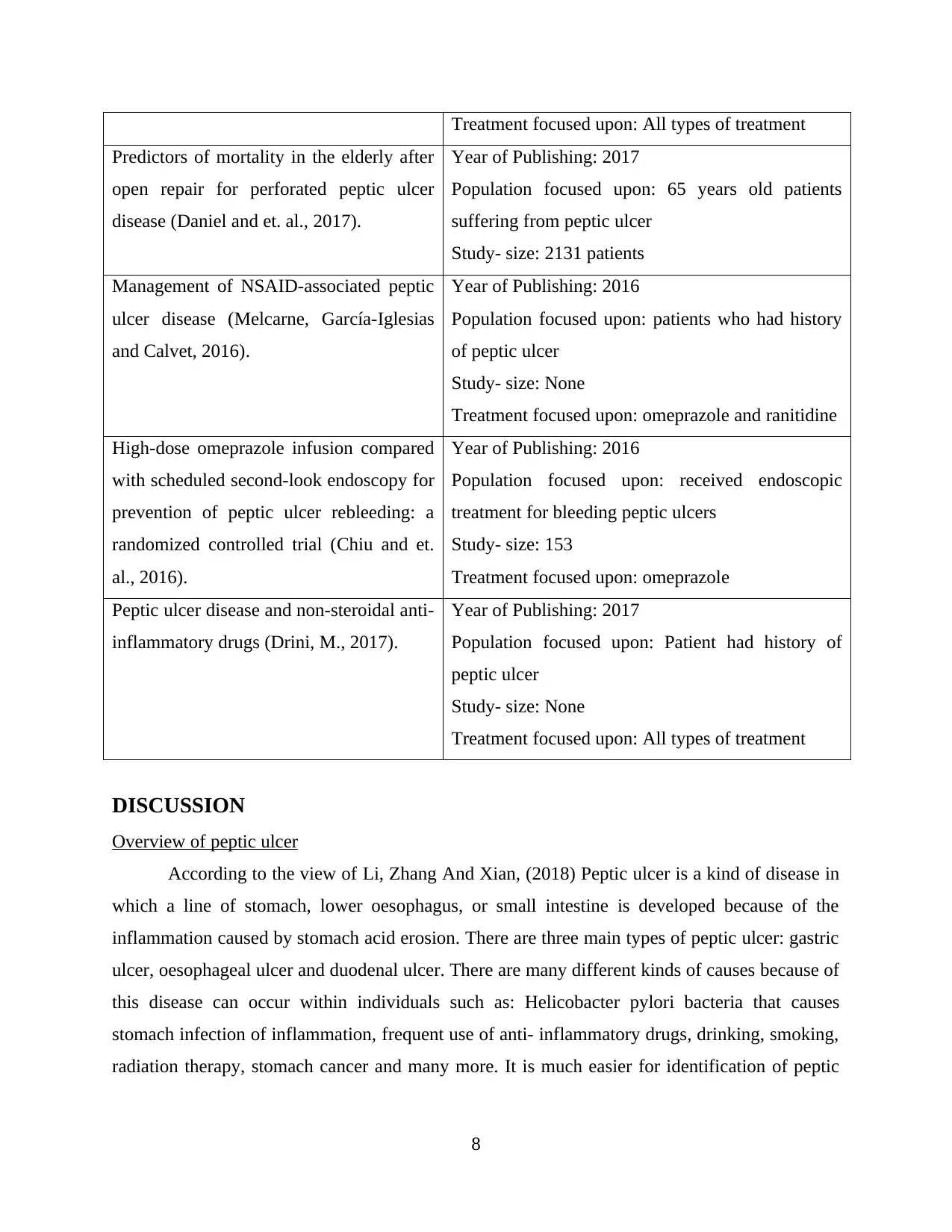
Treatment focused upon: All types of treatment
Predictors of mortality in the elderly after
open repair for perforated peptic ulcer
disease (Daniel and et. al., 2017).
Year of Publishing: 2017
Population focused upon: 65 years old patients
suffering from peptic ulcer
Study- size: 2131 patients
Management of NSAID-associated peptic
ulcer disease (Melcarne, García-Iglesias
and Calvet, 2016).
Year of Publishing: 2016
Population focused upon: patients who had history
of peptic ulcer
Study- size: None
Treatment focused upon: omeprazole and ranitidine
High-dose omeprazole infusion compared
with scheduled second-look endoscopy for
prevention of peptic ulcer rebleeding: a
randomized controlled trial (Chiu and et.
al., 2016).
Year of Publishing: 2016
Population focused upon: received endoscopic
treatment for bleeding peptic ulcers
Study- size: 153
Treatment focused upon: omeprazole
Peptic ulcer disease and non-steroidal anti-
inflammatory drugs (Drini, M., 2017).
Year of Publishing: 2017
Population focused upon: Patient had history of
peptic ulcer
Study- size: None
Treatment focused upon: All types of treatment
DISCUSSION
Overview of peptic ulcer
According to the view of Li, Zhang And Xian, (2018) Peptic ulcer is a kind of disease in
which a line of stomach, lower oesophagus, or small intestine is developed because of the
inflammation caused by stomach acid erosion. There are three main types of peptic ulcer: gastric
ulcer, oesophageal ulcer and duodenal ulcer. There are many different kinds of causes because of
this disease can occur within individuals such as: Helicobacter pylori bacteria that causes
stomach infection of inflammation, frequent use of anti- inflammatory drugs, drinking, smoking,
radiation therapy, stomach cancer and many more. It is much easier for identification of peptic
8
Predictors of mortality in the elderly after
open repair for perforated peptic ulcer
disease (Daniel and et. al., 2017).
Year of Publishing: 2017
Population focused upon: 65 years old patients
suffering from peptic ulcer
Study- size: 2131 patients
Management of NSAID-associated peptic
ulcer disease (Melcarne, García-Iglesias
and Calvet, 2016).
Year of Publishing: 2016
Population focused upon: patients who had history
of peptic ulcer
Study- size: None
Treatment focused upon: omeprazole and ranitidine
High-dose omeprazole infusion compared
with scheduled second-look endoscopy for
prevention of peptic ulcer rebleeding: a
randomized controlled trial (Chiu and et.
al., 2016).
Year of Publishing: 2016
Population focused upon: received endoscopic
treatment for bleeding peptic ulcers
Study- size: 153
Treatment focused upon: omeprazole
Peptic ulcer disease and non-steroidal anti-
inflammatory drugs (Drini, M., 2017).
Year of Publishing: 2017
Population focused upon: Patient had history of
peptic ulcer
Study- size: None
Treatment focused upon: All types of treatment
DISCUSSION
Overview of peptic ulcer
According to the view of Li, Zhang And Xian, (2018) Peptic ulcer is a kind of disease in
which a line of stomach, lower oesophagus, or small intestine is developed because of the
inflammation caused by stomach acid erosion. There are three main types of peptic ulcer: gastric
ulcer, oesophageal ulcer and duodenal ulcer. There are many different kinds of causes because of
this disease can occur within individuals such as: Helicobacter pylori bacteria that causes
stomach infection of inflammation, frequent use of anti- inflammatory drugs, drinking, smoking,
radiation therapy, stomach cancer and many more. It is much easier for identification of peptic
8
Secure Best Marks with AI Grader
Need help grading? Try our AI Grader for instant feedback on your assignments.
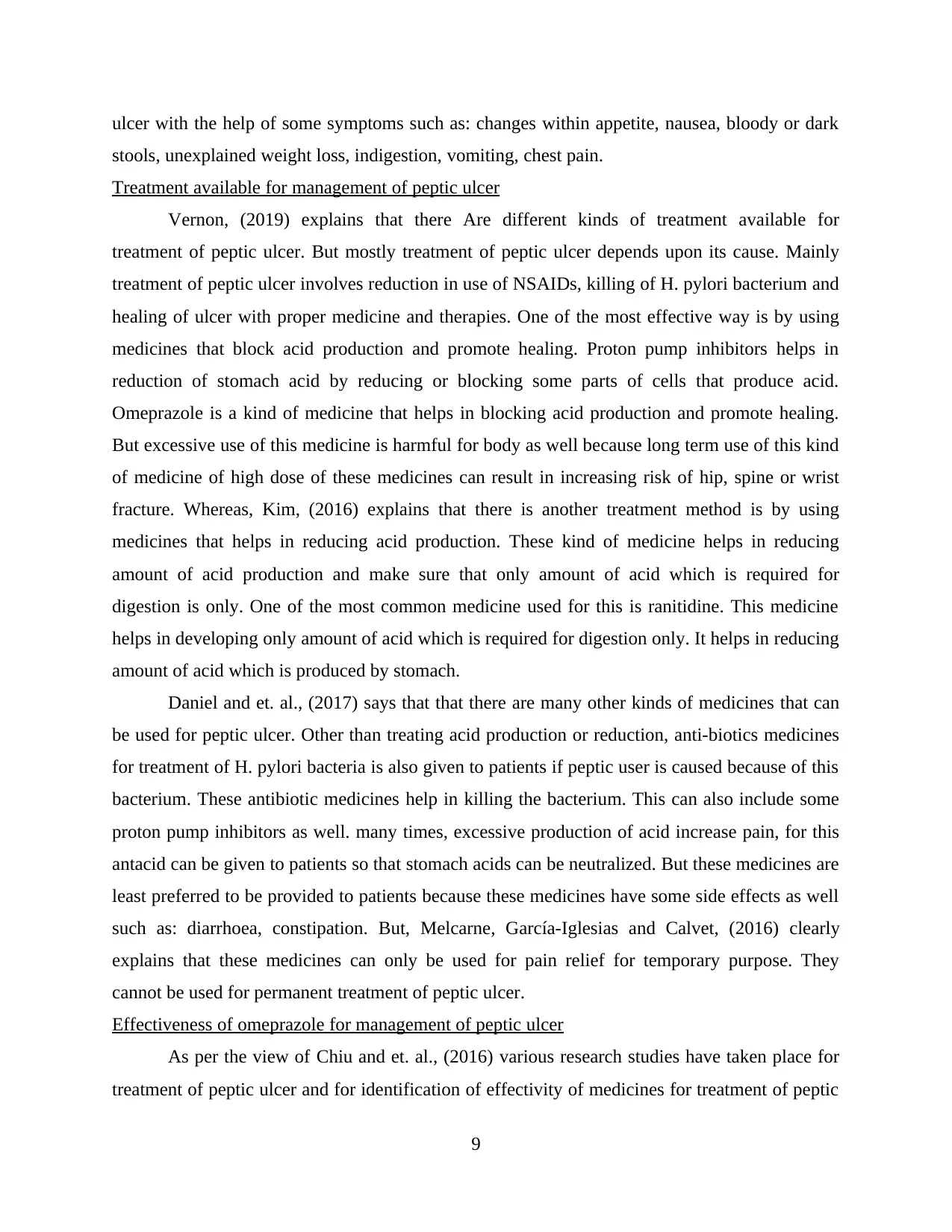
ulcer with the help of some symptoms such as: changes within appetite, nausea, bloody or dark
stools, unexplained weight loss, indigestion, vomiting, chest pain.
Treatment available for management of peptic ulcer
Vernon, (2019) explains that there Are different kinds of treatment available for
treatment of peptic ulcer. But mostly treatment of peptic ulcer depends upon its cause. Mainly
treatment of peptic ulcer involves reduction in use of NSAIDs, killing of H. pylori bacterium and
healing of ulcer with proper medicine and therapies. One of the most effective way is by using
medicines that block acid production and promote healing. Proton pump inhibitors helps in
reduction of stomach acid by reducing or blocking some parts of cells that produce acid.
Omeprazole is a kind of medicine that helps in blocking acid production and promote healing.
But excessive use of this medicine is harmful for body as well because long term use of this kind
of medicine of high dose of these medicines can result in increasing risk of hip, spine or wrist
fracture. Whereas, Kim, (2016) explains that there is another treatment method is by using
medicines that helps in reducing acid production. These kind of medicine helps in reducing
amount of acid production and make sure that only amount of acid which is required for
digestion is only. One of the most common medicine used for this is ranitidine. This medicine
helps in developing only amount of acid which is required for digestion only. It helps in reducing
amount of acid which is produced by stomach.
Daniel and et. al., (2017) says that that there are many other kinds of medicines that can
be used for peptic ulcer. Other than treating acid production or reduction, anti-biotics medicines
for treatment of H. pylori bacteria is also given to patients if peptic user is caused because of this
bacterium. These antibiotic medicines help in killing the bacterium. This can also include some
proton pump inhibitors as well. many times, excessive production of acid increase pain, for this
antacid can be given to patients so that stomach acids can be neutralized. But these medicines are
least preferred to be provided to patients because these medicines have some side effects as well
such as: diarrhoea, constipation. But, Melcarne, García-Iglesias and Calvet, (2016) clearly
explains that these medicines can only be used for pain relief for temporary purpose. They
cannot be used for permanent treatment of peptic ulcer.
Effectiveness of omeprazole for management of peptic ulcer
As per the view of Chiu and et. al., (2016) various research studies have taken place for
treatment of peptic ulcer and for identification of effectivity of medicines for treatment of peptic
9
stools, unexplained weight loss, indigestion, vomiting, chest pain.
Treatment available for management of peptic ulcer
Vernon, (2019) explains that there Are different kinds of treatment available for
treatment of peptic ulcer. But mostly treatment of peptic ulcer depends upon its cause. Mainly
treatment of peptic ulcer involves reduction in use of NSAIDs, killing of H. pylori bacterium and
healing of ulcer with proper medicine and therapies. One of the most effective way is by using
medicines that block acid production and promote healing. Proton pump inhibitors helps in
reduction of stomach acid by reducing or blocking some parts of cells that produce acid.
Omeprazole is a kind of medicine that helps in blocking acid production and promote healing.
But excessive use of this medicine is harmful for body as well because long term use of this kind
of medicine of high dose of these medicines can result in increasing risk of hip, spine or wrist
fracture. Whereas, Kim, (2016) explains that there is another treatment method is by using
medicines that helps in reducing acid production. These kind of medicine helps in reducing
amount of acid production and make sure that only amount of acid which is required for
digestion is only. One of the most common medicine used for this is ranitidine. This medicine
helps in developing only amount of acid which is required for digestion only. It helps in reducing
amount of acid which is produced by stomach.
Daniel and et. al., (2017) says that that there are many other kinds of medicines that can
be used for peptic ulcer. Other than treating acid production or reduction, anti-biotics medicines
for treatment of H. pylori bacteria is also given to patients if peptic user is caused because of this
bacterium. These antibiotic medicines help in killing the bacterium. This can also include some
proton pump inhibitors as well. many times, excessive production of acid increase pain, for this
antacid can be given to patients so that stomach acids can be neutralized. But these medicines are
least preferred to be provided to patients because these medicines have some side effects as well
such as: diarrhoea, constipation. But, Melcarne, García-Iglesias and Calvet, (2016) clearly
explains that these medicines can only be used for pain relief for temporary purpose. They
cannot be used for permanent treatment of peptic ulcer.
Effectiveness of omeprazole for management of peptic ulcer
As per the view of Chiu and et. al., (2016) various research studies have taken place for
treatment of peptic ulcer and for identification of effectivity of medicines for treatment of peptic
9
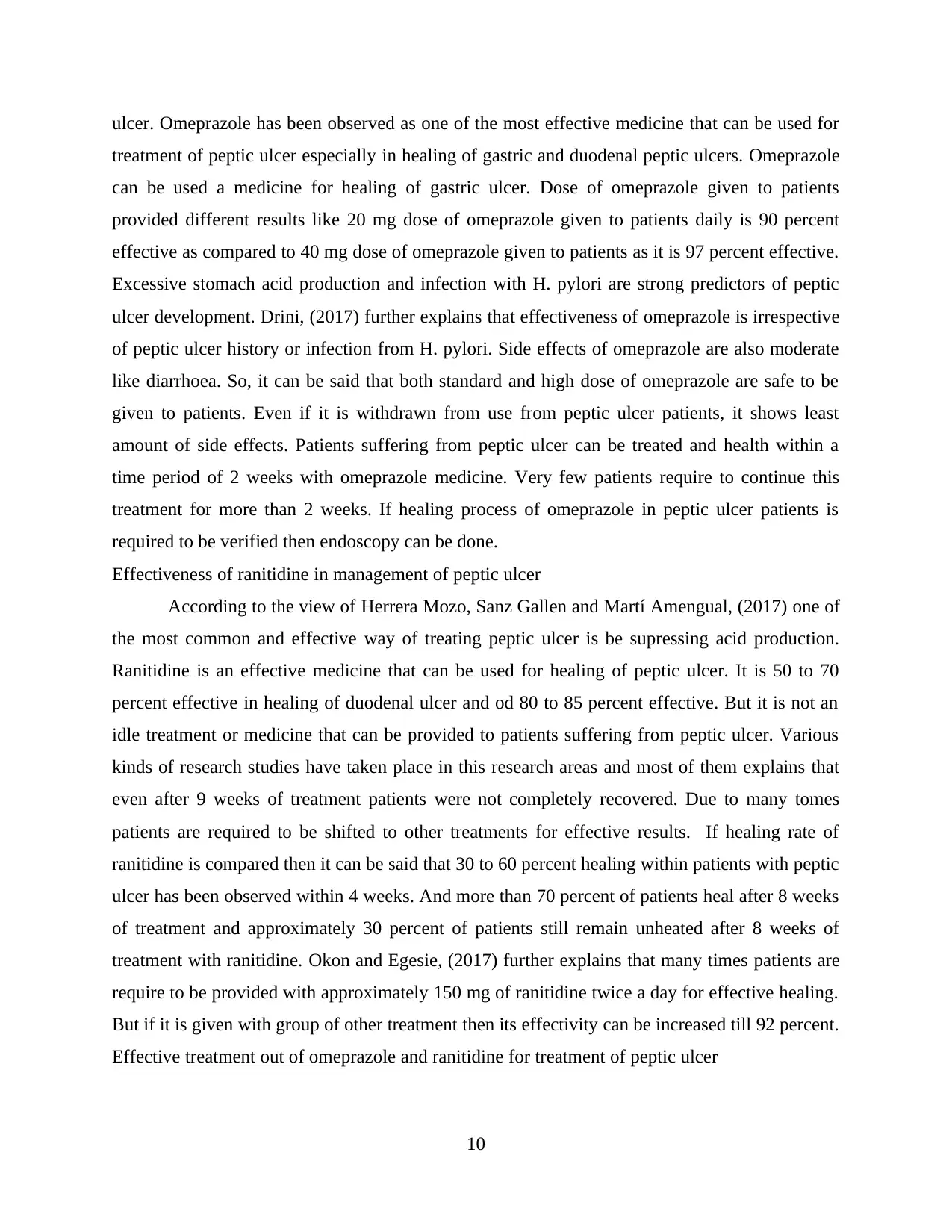
ulcer. Omeprazole has been observed as one of the most effective medicine that can be used for
treatment of peptic ulcer especially in healing of gastric and duodenal peptic ulcers. Omeprazole
can be used a medicine for healing of gastric ulcer. Dose of omeprazole given to patients
provided different results like 20 mg dose of omeprazole given to patients daily is 90 percent
effective as compared to 40 mg dose of omeprazole given to patients as it is 97 percent effective.
Excessive stomach acid production and infection with H. pylori are strong predictors of peptic
ulcer development. Drini, (2017) further explains that effectiveness of omeprazole is irrespective
of peptic ulcer history or infection from H. pylori. Side effects of omeprazole are also moderate
like diarrhoea. So, it can be said that both standard and high dose of omeprazole are safe to be
given to patients. Even if it is withdrawn from use from peptic ulcer patients, it shows least
amount of side effects. Patients suffering from peptic ulcer can be treated and health within a
time period of 2 weeks with omeprazole medicine. Very few patients require to continue this
treatment for more than 2 weeks. If healing process of omeprazole in peptic ulcer patients is
required to be verified then endoscopy can be done.
Effectiveness of ranitidine in management of peptic ulcer
According to the view of Herrera Mozo, Sanz Gallen and Martí Amengual, (2017) one of
the most common and effective way of treating peptic ulcer is be supressing acid production.
Ranitidine is an effective medicine that can be used for healing of peptic ulcer. It is 50 to 70
percent effective in healing of duodenal ulcer and od 80 to 85 percent effective. But it is not an
idle treatment or medicine that can be provided to patients suffering from peptic ulcer. Various
kinds of research studies have taken place in this research areas and most of them explains that
even after 9 weeks of treatment patients were not completely recovered. Due to many tomes
patients are required to be shifted to other treatments for effective results. If healing rate of
ranitidine is compared then it can be said that 30 to 60 percent healing within patients with peptic
ulcer has been observed within 4 weeks. And more than 70 percent of patients heal after 8 weeks
of treatment and approximately 30 percent of patients still remain unheated after 8 weeks of
treatment with ranitidine. Okon and Egesie, (2017) further explains that many times patients are
require to be provided with approximately 150 mg of ranitidine twice a day for effective healing.
But if it is given with group of other treatment then its effectivity can be increased till 92 percent.
Effective treatment out of omeprazole and ranitidine for treatment of peptic ulcer
10
treatment of peptic ulcer especially in healing of gastric and duodenal peptic ulcers. Omeprazole
can be used a medicine for healing of gastric ulcer. Dose of omeprazole given to patients
provided different results like 20 mg dose of omeprazole given to patients daily is 90 percent
effective as compared to 40 mg dose of omeprazole given to patients as it is 97 percent effective.
Excessive stomach acid production and infection with H. pylori are strong predictors of peptic
ulcer development. Drini, (2017) further explains that effectiveness of omeprazole is irrespective
of peptic ulcer history or infection from H. pylori. Side effects of omeprazole are also moderate
like diarrhoea. So, it can be said that both standard and high dose of omeprazole are safe to be
given to patients. Even if it is withdrawn from use from peptic ulcer patients, it shows least
amount of side effects. Patients suffering from peptic ulcer can be treated and health within a
time period of 2 weeks with omeprazole medicine. Very few patients require to continue this
treatment for more than 2 weeks. If healing process of omeprazole in peptic ulcer patients is
required to be verified then endoscopy can be done.
Effectiveness of ranitidine in management of peptic ulcer
According to the view of Herrera Mozo, Sanz Gallen and Martí Amengual, (2017) one of
the most common and effective way of treating peptic ulcer is be supressing acid production.
Ranitidine is an effective medicine that can be used for healing of peptic ulcer. It is 50 to 70
percent effective in healing of duodenal ulcer and od 80 to 85 percent effective. But it is not an
idle treatment or medicine that can be provided to patients suffering from peptic ulcer. Various
kinds of research studies have taken place in this research areas and most of them explains that
even after 9 weeks of treatment patients were not completely recovered. Due to many tomes
patients are required to be shifted to other treatments for effective results. If healing rate of
ranitidine is compared then it can be said that 30 to 60 percent healing within patients with peptic
ulcer has been observed within 4 weeks. And more than 70 percent of patients heal after 8 weeks
of treatment and approximately 30 percent of patients still remain unheated after 8 weeks of
treatment with ranitidine. Okon and Egesie, (2017) further explains that many times patients are
require to be provided with approximately 150 mg of ranitidine twice a day for effective healing.
But if it is given with group of other treatment then its effectivity can be increased till 92 percent.
Effective treatment out of omeprazole and ranitidine for treatment of peptic ulcer
10
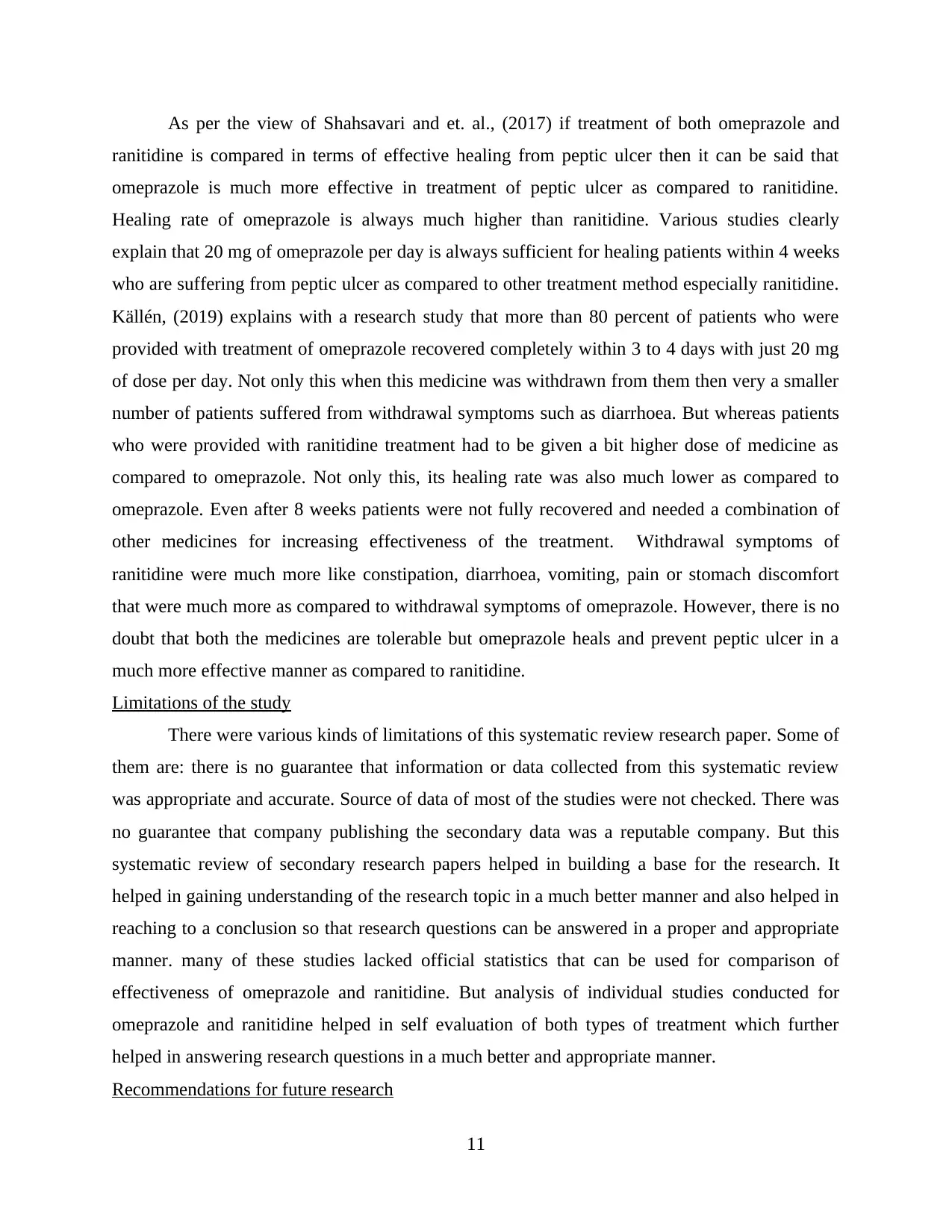
As per the view of Shahsavari and et. al., (2017) if treatment of both omeprazole and
ranitidine is compared in terms of effective healing from peptic ulcer then it can be said that
omeprazole is much more effective in treatment of peptic ulcer as compared to ranitidine.
Healing rate of omeprazole is always much higher than ranitidine. Various studies clearly
explain that 20 mg of omeprazole per day is always sufficient for healing patients within 4 weeks
who are suffering from peptic ulcer as compared to other treatment method especially ranitidine.
Källén, (2019) explains with a research study that more than 80 percent of patients who were
provided with treatment of omeprazole recovered completely within 3 to 4 days with just 20 mg
of dose per day. Not only this when this medicine was withdrawn from them then very a smaller
number of patients suffered from withdrawal symptoms such as diarrhoea. But whereas patients
who were provided with ranitidine treatment had to be given a bit higher dose of medicine as
compared to omeprazole. Not only this, its healing rate was also much lower as compared to
omeprazole. Even after 8 weeks patients were not fully recovered and needed a combination of
other medicines for increasing effectiveness of the treatment. Withdrawal symptoms of
ranitidine were much more like constipation, diarrhoea, vomiting, pain or stomach discomfort
that were much more as compared to withdrawal symptoms of omeprazole. However, there is no
doubt that both the medicines are tolerable but omeprazole heals and prevent peptic ulcer in a
much more effective manner as compared to ranitidine.
Limitations of the study
There were various kinds of limitations of this systematic review research paper. Some of
them are: there is no guarantee that information or data collected from this systematic review
was appropriate and accurate. Source of data of most of the studies were not checked. There was
no guarantee that company publishing the secondary data was a reputable company. But this
systematic review of secondary research papers helped in building a base for the research. It
helped in gaining understanding of the research topic in a much better manner and also helped in
reaching to a conclusion so that research questions can be answered in a proper and appropriate
manner. many of these studies lacked official statistics that can be used for comparison of
effectiveness of omeprazole and ranitidine. But analysis of individual studies conducted for
omeprazole and ranitidine helped in self evaluation of both types of treatment which further
helped in answering research questions in a much better and appropriate manner.
Recommendations for future research
11
ranitidine is compared in terms of effective healing from peptic ulcer then it can be said that
omeprazole is much more effective in treatment of peptic ulcer as compared to ranitidine.
Healing rate of omeprazole is always much higher than ranitidine. Various studies clearly
explain that 20 mg of omeprazole per day is always sufficient for healing patients within 4 weeks
who are suffering from peptic ulcer as compared to other treatment method especially ranitidine.
Källén, (2019) explains with a research study that more than 80 percent of patients who were
provided with treatment of omeprazole recovered completely within 3 to 4 days with just 20 mg
of dose per day. Not only this when this medicine was withdrawn from them then very a smaller
number of patients suffered from withdrawal symptoms such as diarrhoea. But whereas patients
who were provided with ranitidine treatment had to be given a bit higher dose of medicine as
compared to omeprazole. Not only this, its healing rate was also much lower as compared to
omeprazole. Even after 8 weeks patients were not fully recovered and needed a combination of
other medicines for increasing effectiveness of the treatment. Withdrawal symptoms of
ranitidine were much more like constipation, diarrhoea, vomiting, pain or stomach discomfort
that were much more as compared to withdrawal symptoms of omeprazole. However, there is no
doubt that both the medicines are tolerable but omeprazole heals and prevent peptic ulcer in a
much more effective manner as compared to ranitidine.
Limitations of the study
There were various kinds of limitations of this systematic review research paper. Some of
them are: there is no guarantee that information or data collected from this systematic review
was appropriate and accurate. Source of data of most of the studies were not checked. There was
no guarantee that company publishing the secondary data was a reputable company. But this
systematic review of secondary research papers helped in building a base for the research. It
helped in gaining understanding of the research topic in a much better manner and also helped in
reaching to a conclusion so that research questions can be answered in a proper and appropriate
manner. many of these studies lacked official statistics that can be used for comparison of
effectiveness of omeprazole and ranitidine. But analysis of individual studies conducted for
omeprazole and ranitidine helped in self evaluation of both types of treatment which further
helped in answering research questions in a much better and appropriate manner.
Recommendations for future research
11
Paraphrase This Document
Need a fresh take? Get an instant paraphrase of this document with our AI Paraphraser
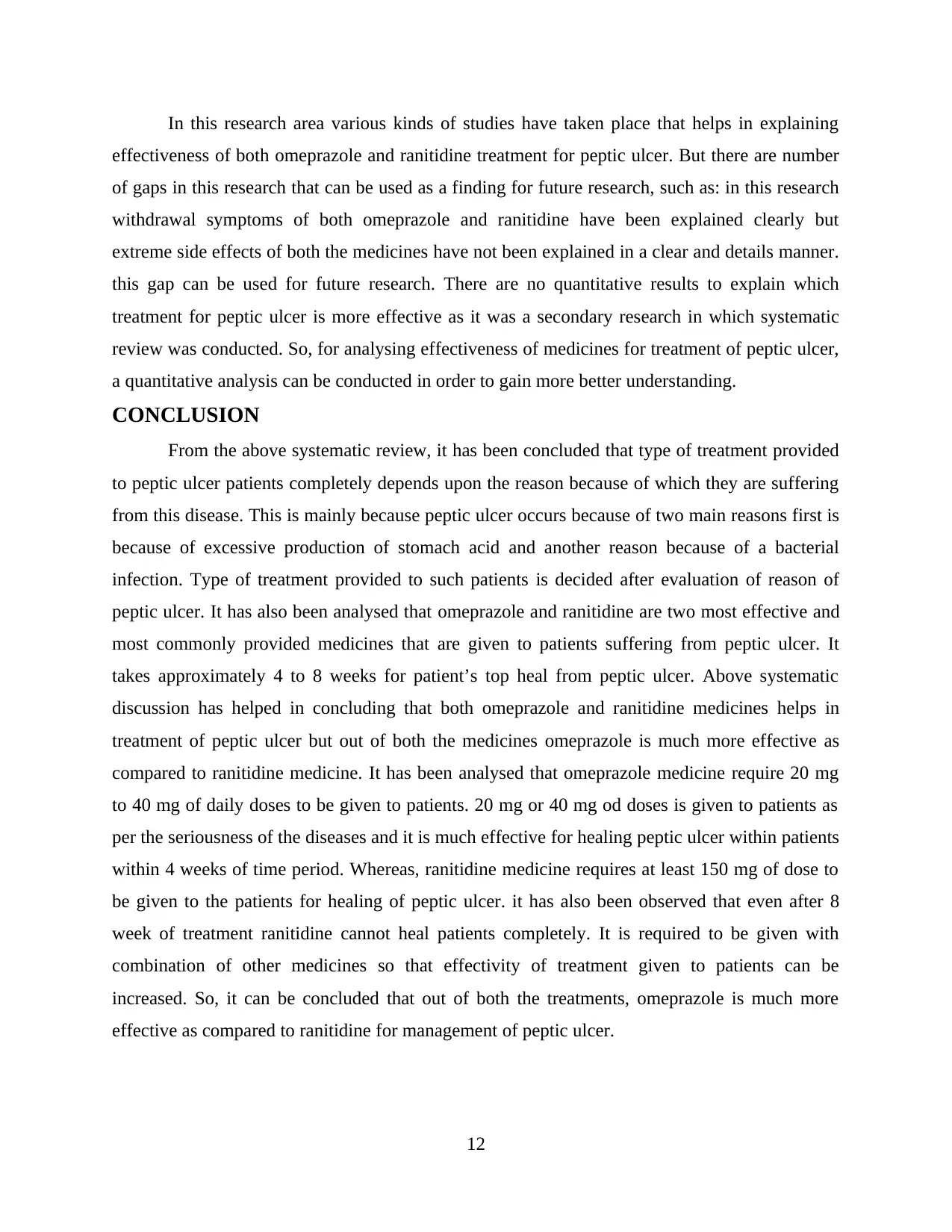
In this research area various kinds of studies have taken place that helps in explaining
effectiveness of both omeprazole and ranitidine treatment for peptic ulcer. But there are number
of gaps in this research that can be used as a finding for future research, such as: in this research
withdrawal symptoms of both omeprazole and ranitidine have been explained clearly but
extreme side effects of both the medicines have not been explained in a clear and details manner.
this gap can be used for future research. There are no quantitative results to explain which
treatment for peptic ulcer is more effective as it was a secondary research in which systematic
review was conducted. So, for analysing effectiveness of medicines for treatment of peptic ulcer,
a quantitative analysis can be conducted in order to gain more better understanding.
CONCLUSION
From the above systematic review, it has been concluded that type of treatment provided
to peptic ulcer patients completely depends upon the reason because of which they are suffering
from this disease. This is mainly because peptic ulcer occurs because of two main reasons first is
because of excessive production of stomach acid and another reason because of a bacterial
infection. Type of treatment provided to such patients is decided after evaluation of reason of
peptic ulcer. It has also been analysed that omeprazole and ranitidine are two most effective and
most commonly provided medicines that are given to patients suffering from peptic ulcer. It
takes approximately 4 to 8 weeks for patient’s top heal from peptic ulcer. Above systematic
discussion has helped in concluding that both omeprazole and ranitidine medicines helps in
treatment of peptic ulcer but out of both the medicines omeprazole is much more effective as
compared to ranitidine medicine. It has been analysed that omeprazole medicine require 20 mg
to 40 mg of daily doses to be given to patients. 20 mg or 40 mg od doses is given to patients as
per the seriousness of the diseases and it is much effective for healing peptic ulcer within patients
within 4 weeks of time period. Whereas, ranitidine medicine requires at least 150 mg of dose to
be given to the patients for healing of peptic ulcer. it has also been observed that even after 8
week of treatment ranitidine cannot heal patients completely. It is required to be given with
combination of other medicines so that effectivity of treatment given to patients can be
increased. So, it can be concluded that out of both the treatments, omeprazole is much more
effective as compared to ranitidine for management of peptic ulcer.
12
effectiveness of both omeprazole and ranitidine treatment for peptic ulcer. But there are number
of gaps in this research that can be used as a finding for future research, such as: in this research
withdrawal symptoms of both omeprazole and ranitidine have been explained clearly but
extreme side effects of both the medicines have not been explained in a clear and details manner.
this gap can be used for future research. There are no quantitative results to explain which
treatment for peptic ulcer is more effective as it was a secondary research in which systematic
review was conducted. So, for analysing effectiveness of medicines for treatment of peptic ulcer,
a quantitative analysis can be conducted in order to gain more better understanding.
CONCLUSION
From the above systematic review, it has been concluded that type of treatment provided
to peptic ulcer patients completely depends upon the reason because of which they are suffering
from this disease. This is mainly because peptic ulcer occurs because of two main reasons first is
because of excessive production of stomach acid and another reason because of a bacterial
infection. Type of treatment provided to such patients is decided after evaluation of reason of
peptic ulcer. It has also been analysed that omeprazole and ranitidine are two most effective and
most commonly provided medicines that are given to patients suffering from peptic ulcer. It
takes approximately 4 to 8 weeks for patient’s top heal from peptic ulcer. Above systematic
discussion has helped in concluding that both omeprazole and ranitidine medicines helps in
treatment of peptic ulcer but out of both the medicines omeprazole is much more effective as
compared to ranitidine medicine. It has been analysed that omeprazole medicine require 20 mg
to 40 mg of daily doses to be given to patients. 20 mg or 40 mg od doses is given to patients as
per the seriousness of the diseases and it is much effective for healing peptic ulcer within patients
within 4 weeks of time period. Whereas, ranitidine medicine requires at least 150 mg of dose to
be given to the patients for healing of peptic ulcer. it has also been observed that even after 8
week of treatment ranitidine cannot heal patients completely. It is required to be given with
combination of other medicines so that effectivity of treatment given to patients can be
increased. So, it can be concluded that out of both the treatments, omeprazole is much more
effective as compared to ranitidine for management of peptic ulcer.
12
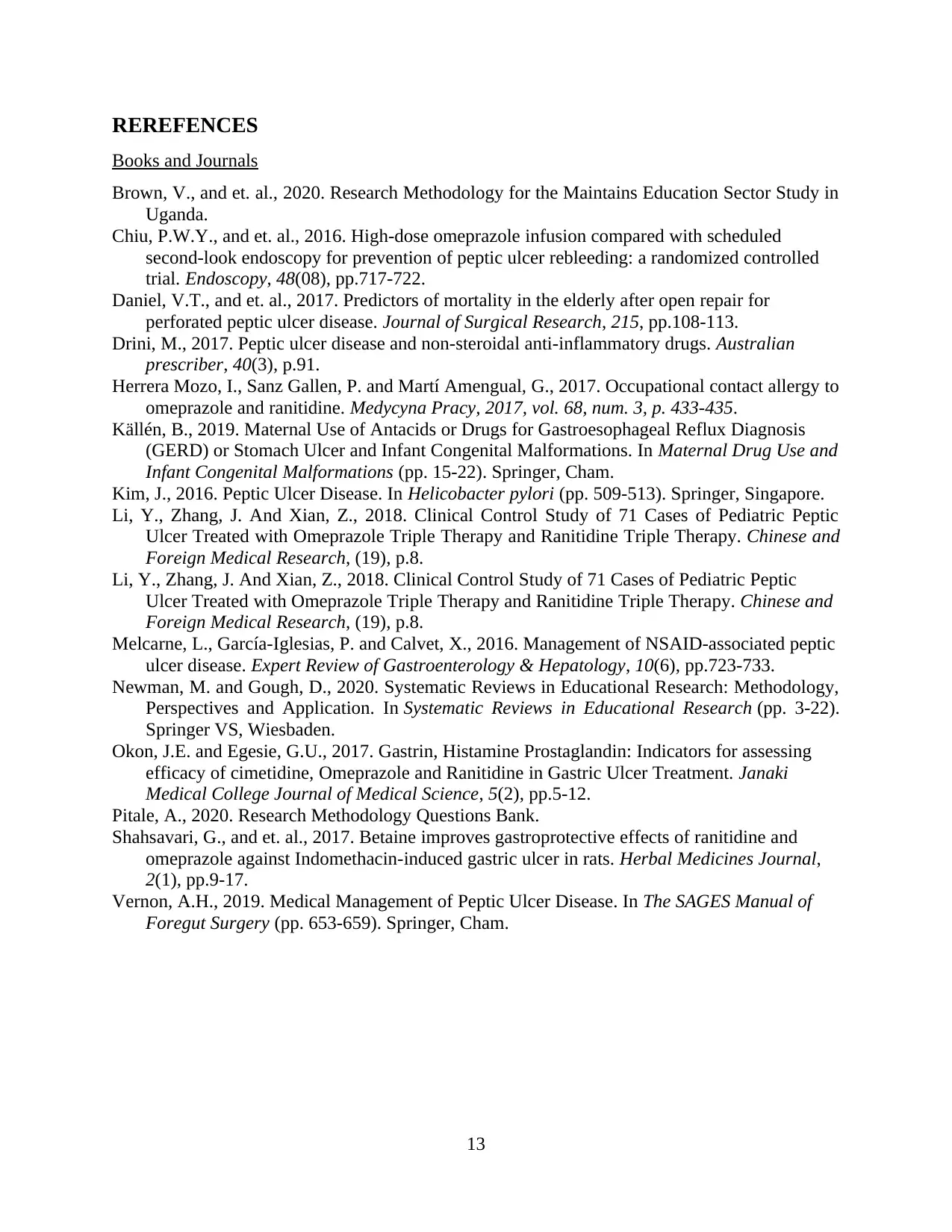
REREFENCES
Books and Journals
Brown, V., and et. al., 2020. Research Methodology for the Maintains Education Sector Study in
Uganda.
Chiu, P.W.Y., and et. al., 2016. High-dose omeprazole infusion compared with scheduled
second-look endoscopy for prevention of peptic ulcer rebleeding: a randomized controlled
trial. Endoscopy, 48(08), pp.717-722.
Daniel, V.T., and et. al., 2017. Predictors of mortality in the elderly after open repair for
perforated peptic ulcer disease. Journal of Surgical Research, 215, pp.108-113.
Drini, M., 2017. Peptic ulcer disease and non-steroidal anti-inflammatory drugs. Australian
prescriber, 40(3), p.91.
Herrera Mozo, I., Sanz Gallen, P. and Martí Amengual, G., 2017. Occupational contact allergy to
omeprazole and ranitidine. Medycyna Pracy, 2017, vol. 68, num. 3, p. 433-435.
Källén, B., 2019. Maternal Use of Antacids or Drugs for Gastroesophageal Reflux Diagnosis
(GERD) or Stomach Ulcer and Infant Congenital Malformations. In Maternal Drug Use and
Infant Congenital Malformations (pp. 15-22). Springer, Cham.
Kim, J., 2016. Peptic Ulcer Disease. In Helicobacter pylori (pp. 509-513). Springer, Singapore.
Li, Y., Zhang, J. And Xian, Z., 2018. Clinical Control Study of 71 Cases of Pediatric Peptic
Ulcer Treated with Omeprazole Triple Therapy and Ranitidine Triple Therapy. Chinese and
Foreign Medical Research, (19), p.8.
Li, Y., Zhang, J. And Xian, Z., 2018. Clinical Control Study of 71 Cases of Pediatric Peptic
Ulcer Treated with Omeprazole Triple Therapy and Ranitidine Triple Therapy. Chinese and
Foreign Medical Research, (19), p.8.
Melcarne, L., García-Iglesias, P. and Calvet, X., 2016. Management of NSAID-associated peptic
ulcer disease. Expert Review of Gastroenterology & Hepatology, 10(6), pp.723-733.
Newman, M. and Gough, D., 2020. Systematic Reviews in Educational Research: Methodology,
Perspectives and Application. In Systematic Reviews in Educational Research (pp. 3-22).
Springer VS, Wiesbaden.
Okon, J.E. and Egesie, G.U., 2017. Gastrin, Histamine Prostaglandin: Indicators for assessing
efficacy of cimetidine, Omeprazole and Ranitidine in Gastric Ulcer Treatment. Janaki
Medical College Journal of Medical Science, 5(2), pp.5-12.
Pitale, A., 2020. Research Methodology Questions Bank.
Shahsavari, G., and et. al., 2017. Betaine improves gastroprotective effects of ranitidine and
omeprazole against Indomethacin-induced gastric ulcer in rats. Herbal Medicines Journal,
2(1), pp.9-17.
Vernon, A.H., 2019. Medical Management of Peptic Ulcer Disease. In The SAGES Manual of
Foregut Surgery (pp. 653-659). Springer, Cham.
13
Books and Journals
Brown, V., and et. al., 2020. Research Methodology for the Maintains Education Sector Study in
Uganda.
Chiu, P.W.Y., and et. al., 2016. High-dose omeprazole infusion compared with scheduled
second-look endoscopy for prevention of peptic ulcer rebleeding: a randomized controlled
trial. Endoscopy, 48(08), pp.717-722.
Daniel, V.T., and et. al., 2017. Predictors of mortality in the elderly after open repair for
perforated peptic ulcer disease. Journal of Surgical Research, 215, pp.108-113.
Drini, M., 2017. Peptic ulcer disease and non-steroidal anti-inflammatory drugs. Australian
prescriber, 40(3), p.91.
Herrera Mozo, I., Sanz Gallen, P. and Martí Amengual, G., 2017. Occupational contact allergy to
omeprazole and ranitidine. Medycyna Pracy, 2017, vol. 68, num. 3, p. 433-435.
Källén, B., 2019. Maternal Use of Antacids or Drugs for Gastroesophageal Reflux Diagnosis
(GERD) or Stomach Ulcer and Infant Congenital Malformations. In Maternal Drug Use and
Infant Congenital Malformations (pp. 15-22). Springer, Cham.
Kim, J., 2016. Peptic Ulcer Disease. In Helicobacter pylori (pp. 509-513). Springer, Singapore.
Li, Y., Zhang, J. And Xian, Z., 2018. Clinical Control Study of 71 Cases of Pediatric Peptic
Ulcer Treated with Omeprazole Triple Therapy and Ranitidine Triple Therapy. Chinese and
Foreign Medical Research, (19), p.8.
Li, Y., Zhang, J. And Xian, Z., 2018. Clinical Control Study of 71 Cases of Pediatric Peptic
Ulcer Treated with Omeprazole Triple Therapy and Ranitidine Triple Therapy. Chinese and
Foreign Medical Research, (19), p.8.
Melcarne, L., García-Iglesias, P. and Calvet, X., 2016. Management of NSAID-associated peptic
ulcer disease. Expert Review of Gastroenterology & Hepatology, 10(6), pp.723-733.
Newman, M. and Gough, D., 2020. Systematic Reviews in Educational Research: Methodology,
Perspectives and Application. In Systematic Reviews in Educational Research (pp. 3-22).
Springer VS, Wiesbaden.
Okon, J.E. and Egesie, G.U., 2017. Gastrin, Histamine Prostaglandin: Indicators for assessing
efficacy of cimetidine, Omeprazole and Ranitidine in Gastric Ulcer Treatment. Janaki
Medical College Journal of Medical Science, 5(2), pp.5-12.
Pitale, A., 2020. Research Methodology Questions Bank.
Shahsavari, G., and et. al., 2017. Betaine improves gastroprotective effects of ranitidine and
omeprazole against Indomethacin-induced gastric ulcer in rats. Herbal Medicines Journal,
2(1), pp.9-17.
Vernon, A.H., 2019. Medical Management of Peptic Ulcer Disease. In The SAGES Manual of
Foregut Surgery (pp. 653-659). Springer, Cham.
13
1 out of 15
Related Documents
Your All-in-One AI-Powered Toolkit for Academic Success.
+13062052269
info@desklib.com
Available 24*7 on WhatsApp / Email
![[object Object]](/_next/static/media/star-bottom.7253800d.svg)
Unlock your academic potential
© 2024 | Zucol Services PVT LTD | All rights reserved.



